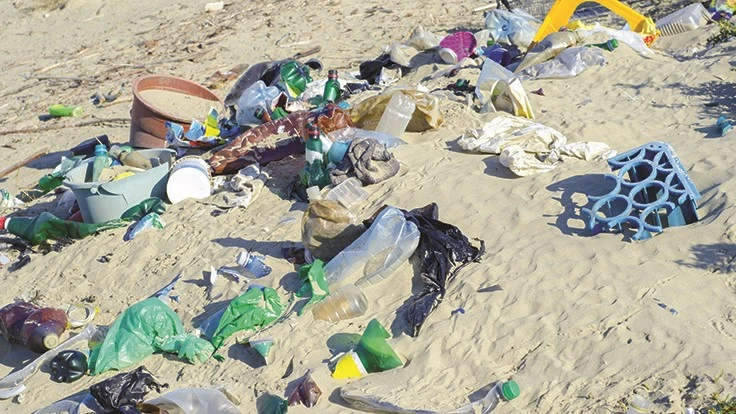
Circulate Capital, the investment management firm dedicated to financing companies, projects and infrastructure to prevent ocean plastic, and SecondMuse, a global business accelerator that works with local stakeholders, leading corporations and government agencies to build resilient economies, have launched The Incubator Network by Circulate Capital and SecondMuse, an initiative to accelerate solutions to ocean plastic by partnering with existing incubators to build ecosystems of waste management and recycling innovators, the organizations says.
Circulate and SecondMuse developed The Incubator Network in partnership with Ocean Conservancy, a leading ocean protection nonprofit; it is supported by a new grant from the U.S. State Department. The Incubator Network’s first collaborative project, the Ocean Plastic Prevention Accelerator, is also supported by the Australian Government's Department of Foreign Affairs and Trade.
Circulate says it anticipates unlocking more than $20 million in funding for The Incubator Network from foundations, corporations and development agencies. The company made the announcement at the G7 Oceans Partnership Summit in Halifax, Nova Scotia, Sept. 20.
By partnering with existing incubator initiatives, The Incubator Network says it seeks to rapidly scale the number of innovators in the sector, enabling eco-systems and support for those innovations. At launch, incubation partners include Ocean Plastic Prevention Accelerator, WeWork Labs India and McKinsey.org.
The Incubator Network initially will focus on supporting incubation activities in Indonesia and India, with additional interest in Vietnam, Thailand and The Philippines. It is currently looking to partner with additional incubator partners and programs. More information on how incubation programs can join the network is available at www.circulatecapital.com/rfp.
“The Incubator Network by Circulate Capital and SecondMuse will provide financial and technical
resources to increase the quality and quantity of companies and programs working to stop plastic
leakage to the ocean and environment in South and Southeast Asia,” says Rob Kaplan, founder and CEO
of Circulate Capital. “As our team has been developing financing mechanisms for the region, we have
recognized that incubation, technical assistance and capacity building is critically needed to improve the
opportunities for all investors in the space.”
He continues, “We are grateful to the U.S. Department of State and our corporate partners for their support and to the Ocean Conservancy for their continued collaboration. Our goals are ambitious, but we are inspired by the tremendous strides already being made by our initial incubator partners, Ocean Plastic Prevention Accelerator, WeWork Labs India and McKinsey.org.”
Chever Voltmer, plastics initiative director for Ocean Conservancy, says, “After over 30 years of organizing the International Coastal Cleanup and cataloging the items washing up on shorelines around the world, we know we need to go upstream to solve the problem. Through the Incubator Network, we can leverage the strengths of partners in government, business, academia and nongovernmental organizations to bring together the political, economic, financial and social pieces needed to solve this complex puzzle.”
“For the last decade, SecondMuse has been using business accelerators to build economies that create
social and environmental justice,” says the organization’s co-founder Todd Khozein. “In doing so we have learned that the most resilient economies are those that are inclusive and adaptive to local
circumstances. For a problem as big as ocean plastics, we need precisely these kinds of robust innovation ecosystems in cities throughout the region and we are thrilled to be partnering with Circulate Capital and the Ocean Conservancy to accomplish this.”
“WeWork Labs is inspired by the work Circulate Capital is doing, and we are excited to partner with an
organization that aligns with our own global environmental efforts to combat plastic pollution,” says
Roee Adler, senior vice president and global head of WeWork Labs. “India is a booming center for startup innovation, and we feel confident that by leveraging the creativity and inventiveness happening throughout India, The Incubator Network will make a long-lasting impact in helping solve this global challenge."
“We're excited by the launch of Circulate Capital's Incubator Network,” says Shannon Bouton, global
executive director of sustainable communities at McKinsey.org. “Not only will it provide vital investment but it will also create an ecosystem of organizations to foster collaboration and partnership in addressing the critical plastics waste challenge the world faces. McKinsey.org’s Sustainable Communities program is working with local communities, organizations and governments to develop recycling systems which empower communities, provide companies with reliable supplies of recycled material and accelerate the transition to a circular economy.”
More than half of the 8.8 million tons of plastic that flow into the ocean every year come from developing countries in South and Southeast Asia, where waste management has lagged behind rapid economic growth, Circulate Capital says. Analysis shows that a 45 percent reduction in plastic leakage is possible by improving waste management and recycling infrastructure in the five countries where the Circulate Capital operates.
Female workers play a role at all levels in the waste management chain but most dramatically at the
bottom. With this in mind, a primary focus of The Incubator Network is to advance opportunities for
women in its countries of operation, and it will address this objective in its first partnership with the
Ocean Plastic Prevention Accelerator as well as in other locations as the project scales, Circulate Capital says.
Latest from Recycling Today
- Orion ramping up Rocky Mountain Steel rail line
- Proposed bill would provide ‘regulatory clarity’ for chemical recycling
- Alberta Ag-Plastic pilot program continues, expands with renewed funding
- ReMA urges open intra-North American scrap trade
- Axium awarded by regional organization
- Update: China to introduce steel export quotas
- Thyssenkrupp idles capacity in Europe
- Phoenix Technologies closes Ohio rPET facility





